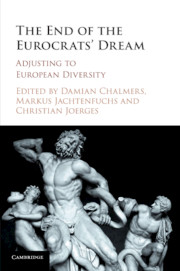Crossref Citations
This Book has been
cited by the following publications. This list is generated based on data provided by Crossref.
Joerges, Christian
2016.
Europe and European Studies in Crisis. Inter-Disciplinary and Intra-Disciplinary Schisms in Legal and Political Science.
SSRN Electronic Journal,
Börzel, Tanja A.
2016.
From EU Governance of Crisis to Crisis of EU Governance: Regulatory Failure, Redistributive Conflict and Eurosceptic Publics.
JCMS: Journal of Common Market Studies,
Vol. 54,
Issue. S1,
p.
8.
White, Jonathan
2017.
Principled disobedience in the EU.
Constellations,
Vol. 24,
Issue. 4,
p.
637.
2018.
The Politics of Justice in European Private Law.
p.
1.
Genschel, Philipp
and
Jachtenfuchs, Markus
2018.
From Market Integration to Core State Powers: The Eurozone Crisis, the Refugee Crisis and Integration Theory.
JCMS: Journal of Common Market Studies,
Vol. 56,
Issue. 1,
p.
178.
Verdun, Amy
and
Zeitlin, Jonathan
2018.
Introduction: the European Semester as a new architecture of EU socioeconomic governance in theory and practice.
Journal of European Public Policy,
Vol. 25,
Issue. 2,
p.
137.
Nicolaidis, Kalypso
2018.
Braving the Waves? Europe's Constitutional Settlement at Twenty.
JCMS: Journal of Common Market Studies,
Vol. 56,
Issue. 7,
p.
1614.
Micklitz, Hans-W
2018.
The Politics of Justice in European Private Law.
Bruszt, Laszlo
and
Vukov, Visnja
2018.
Governing Market Integration and Development—Lessons from Europe’s Eastern and Southern Peripheries: Introduction to the Special Issue.
Studies in Comparative International Development,
Vol. 53,
Issue. 2,
p.
153.
Waele, de Henri
and
Mastenbroek, Ellen
2018.
Fulfilling High Hopes? The Legitimacy Potential of the European Citizens’ Initiative.
Open Political Science,
Vol. 1,
Issue. 1,
p.
75.
2019.
A Republican Europe of States.
p.
71.
2019.
A Republican Europe of States.
p.
213.
Bellamy, Richard
2019.
A Republican Europe of States.
Farrand, Benjamin
and
Rizzi, Marco
2019.
The Crisis behind the Eurocrisis.
p.
23.
2019.
A Republican Europe of States.
p.
1.
2019.
A Republican Europe of States.
p.
238.
Hildebrand, Marius
2019.
„One heart for another nation“. Linke Intellektuelle beobachten die Konjunktur ethno-populistischer Politisierungen als Kehrseite neoliberalen Regierens und entdecken die Nation für sich.
Soziologische Revue,
Vol. 42,
Issue. 3,
p.
418.
2019.
A Republican Europe of States.
p.
209.
Beetz, Jan Pieter
2019.
Safeguarding, shifting, splitting or sharing? Conflicting conceptions of popular sovereignty in the EU-polity.
Journal of European Integration,
Vol. 41,
Issue. 7,
p.
937.
Fossum, John Erik
2019.
Europe's Triangular Challenge: Differentiation, Dominance and Democracy.
SSRN Electronic Journal,





